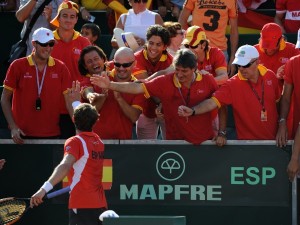
Much was made of the absence of the players ranked one and three in the world before Albert Costa and his counterpart Severin Luthi announced their teams for the opening round of Davis Cup World Group matches. Roger Federer was absent for the Swiss, recovering from a pulmonary complaint (although images showing a clearly unhindered world number one on the practice court on the day the tie began would have been greeted with some chagrin by his team mates), while Rafael Nadal was recovering from the knee injury he sustained at the Australian Open.
And so it was left to Spain’s “reserve” players to see off Switzerland, which they did well enough, if not with the spectacular aplomb with which the star line-up crushed the Czech Republic in December’s final. David Ferrer assumed the mantle of team leader, winning both his singles rubbers. Nicolás Almagro took the responsibility of the second singles berth, losing the opening match to Swiss number two Stanislas Wawrinka but avenging that defeat in the final rubber against Marco Chiudinelli. Spain’s pairing of Tommy Robredo and Marcel Granollers weathered the challenge of Wawrinka and Yves Allegro to win the doubles encounter in four sets, and Costa’s team ran out eventual 4-1 winners.
It did so with only one player, Ferrer, from last year’s Davis Cup-winning team. In 2009, Ferrer, ranked 16 in the world in the current ATP World Tour standing, won six matches out of six in the competition. Nadal won four from four, while Robredo played one and lost one. Granollers made his Davis Cup debut against Switzerland and Almagro had played just twice before, in a 5-0 rout of Peru in 2008.
Spain currently accounts for 25 percent of the top 20 players in the world, and has 12 players in the top 100. Granollers does not even feature in that list – he is ranked 110 in singles yet holds a doubles ranking of 25.
That is Spain’s huge advantage in the Davis Cup. Even without three of its four highest-ranked players – Nadal, Fernando Verdasco and Juan Carlos Ferrero – Switzerland took just one point from the host. Spain has won 19 straight home ties and is gunning for its third consecutive Salad Bowl.
Spain’s reward for its victory is a quarterfinal against France from 9 to 11 July, with the surface and location to be decided by Guy Forget and his team. It is safe to assume that an indoor hard court will be selected, this being the preferred surface of France’s big-hitting Gaël Monfils, Jo-Wilfried Tsonga and Gilles Simon, ranked 15, 11 and 21 respectively. In terms of strength, France is the nearest rival to Spain in the competition. Indeed, outside of France’s top three are a further nine top-100 players. Both nations also have three players ranked in the top 50 in doubles: Julien Benneteau, Tsonga and Michael Llodra for France; Robredo, Granollers and the untried Santiago Ventura for Spain.
“It’s difficult to know who will be in the next team,” said Costa after the Switzerland tie. “There are eight or 10 players that could be there and it depends on the situation and the surface. France has great players and everything will be in their favour. We will go there and give them a good battle for sure.”
“A real pitbull”
“We need five Rafa Nadals to beat Spain,” quipped Forget looking ahead to the encounter. “What’s surprising about Nadal is that whoever he is playing, at whichever tournament and whatever the score, he plays every point as though his life depends on it. If he plays against France in front of 8,000 people he will be a real pitbull,” said the France captain.
Certainly Costa, despite the fine showing of his second string against Switzerland, will hope that Spain’s best players are available for the tie in France. Shorn of its comforting home advantage and surface, Spain will be made to work for a semifinal berth and can expect a partisan, if not hostile, Parisian crowd. History favors the visitor, the most recent meeting between the two ending in a comfortable 4-1 win for Spain on the red clay of Alicante’s plaza de toros in the 2004 semi-finals.
The last time the teams met in France, Spain again claimed victory by three points to two in the quarter-finals in 1972. The tie is likely to be decided by a similarly tight margin in July and despite Spain’s strength in depth, the team must be praying for a fit Nadal to be available.
Nadal is a great player. I dont care if he is winning or losing matches. He is fighting on 100%, and its great there is such a "warior" in ATP at the moment!